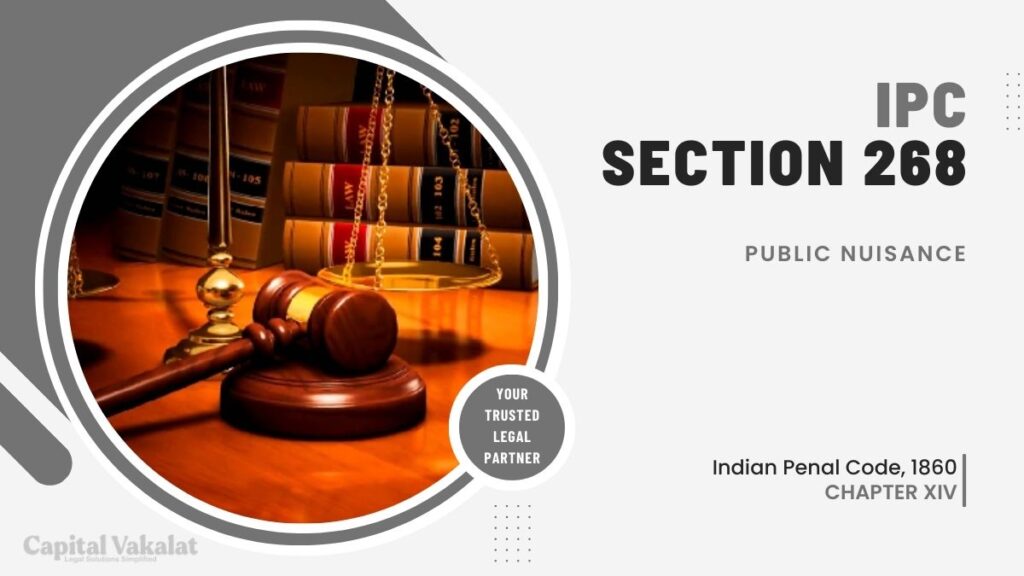Public nuisance, a term that often brings to mind disruptive neighbors or obnoxious behavior in public spaces, is a concern that has far-reaching legal implications. Section 268 of the Indian Penal Code (IPC) deals with the legal aspects surrounding public nuisance and seeks to maintain public order and decency.

In this article, we will delve into the depths of Section 268 IPC, understanding what constitutes public nuisance, the legal consequences, and how authorities tackle this issue.
Introduction to Section 268 IPC
Section 268 of the Indian Penal Code is a crucial legal provision designed to maintain public peace and harmony. It defines public nuisance as an act or omission that causes injury, danger, or annoyance to the public or the people in general who dwell or occupy property in the vicinity. The objective is to ensure that public spaces are free from activities that disrupt the lives of citizens.
Understanding Public Nuisance
Public nuisance is a concept that revolves around the disturbance or interference with the ordinary comforts of life. It can take many forms, from loud noise to the illegal disposal of waste. The essence of public nuisance lies in its impact on the community as a whole, making it a matter of public concern.
Types of Activities Considered as Public Nuisance
a. Noisy Neighbors
Loud parties, blaring music, or constant construction work during odd hours can be a significant source of annoyance for neighbors. Such disturbances fall under the purview of public nuisance.
b. Littering and Dumping
Improper disposal of waste, including littering in public spaces and illegal dumping, poses health hazards and spoils the environment, making it a public nuisance.
c. Public Intoxication
Inebriated individuals creating disturbances in public places can be considered a public nuisance, affecting the peace and safety of those around them.
d. Illegal Vending
Unauthorized street vending that obstructs public pathways or creates disorder can be categorized as public nuisance.
e. Graffiti and Vandalism
Damaging public or private property through graffiti and vandalism not only defaces the environment but also disrupts the tranquility of the neighborhood.
Legal Implications of Section 268 IPC
Penalties and Punishments
Section 268 IPC allows for penalties and punishments for individuals found guilty of creating a public nuisance. These penalties can range from fines to imprisonment, depending on the severity of the offense.
Remedies for Victims
Victims of public nuisance can seek legal remedies, including restraining orders or compensation for the harm they’ve endured.
Landmark Cases Involving Public Nuisance
To understand the real-world impact of Section 268 IPC, we can look at several landmark cases that have set legal precedents and shaped the way public nuisance is handled in India.
The Role of Authorities in Addressing Public Nuisance
Local authorities and law enforcement agencies play a vital role in addressing and mitigating public nuisance. They are responsible for investigating complaints, enforcing the law, and ensuring that public spaces remain peaceful and safe.
Challenges in Enforcing Section 268 IPC
Enforcing Section 268 IPC can be challenging due to the subjectivity of what constitutes “annoyance” or “injury” to the public. Striking a balance between individual rights and public interest is a delicate task.
Prevention and Awareness
Preventing public nuisance requires a collective effort. Promoting awareness about the legal consequences and educating the public about their responsibilities can help mitigate such incidents.
Public Responsiveness and Civic Duties
Citizens also have a crucial role in maintaining public order. By being responsive to concerns in their communities and fulfilling their civic duties, they contribute to a more harmonious environment.
Conclusion
In conclusion, Section 268 IPC is a vital legal provision aimed at maintaining public order and decency. Public nuisance, in its various forms, can disrupt the daily lives of citizens, and this section acts as a deterrent to such behavior. By understanding the legal implications and cooperating with authorities, we can collectively create a more peaceful and orderly society.
Frequently Asked Questions
What are the penalties for committing public nuisance under Section 268 IPC?
Penalties for public nuisance can range from fines to imprisonment, depending on the severity of the offense.
Can victims of public nuisance seek legal remedies?
Yes, victims of public nuisance can seek legal remedies, including restraining orders or compensation for the harm they’ve endured.
What role do local authorities play in addressing public nuisance?
Local authorities and law enforcement agencies are responsible for investigating complaints, enforcing the law, and ensuring that public spaces remain peaceful and safe.
How can citizens contribute to preventing public nuisance?
Citizens can contribute to preventing public nuisance by being responsive to concerns in their communities and fulfilling their civic duties, thereby creating a more harmonious environment.